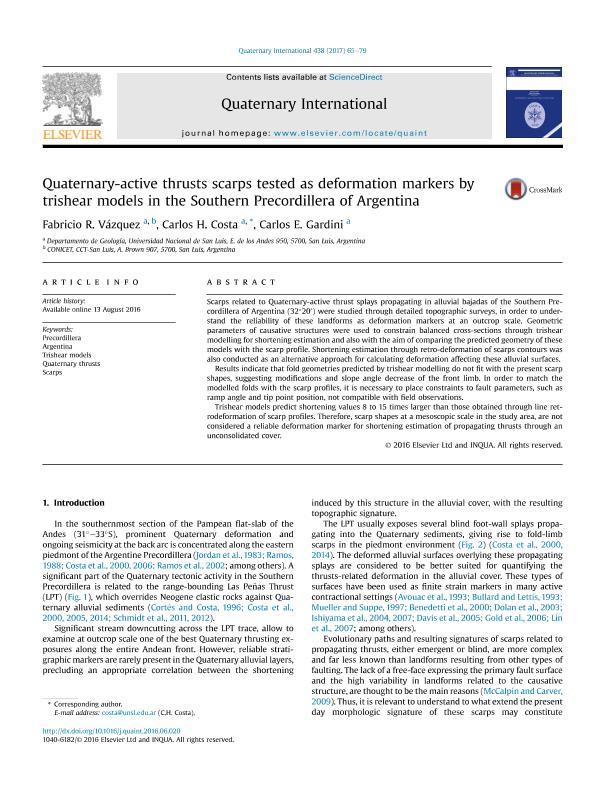Mostrar el registro sencillo del ítem
dc.contributor.author
Vazquez, Fabricio Rodrigo

dc.contributor.author
Costa, Carlos Horacio

dc.contributor.author
Gardini, Carlos Enrique

dc.date.available
2018-09-20T17:30:18Z
dc.date.issued
2017-05
dc.identifier.citation
Vazquez, Fabricio Rodrigo; Costa, Carlos Horacio; Gardini, Carlos Enrique; Quaternary-active thrusts scarps tested as deformation markers by trishear models in the Southern Precordillera of Argentina; Pergamon-Elsevier Science Ltd; Quaternary International; 438; 5-2017; 65-79
dc.identifier.issn
1040-6182
dc.identifier.uri
http://hdl.handle.net/11336/60465
dc.description.abstract
Scarps related to Quaternary-active thrust splays propagating in alluvial bajadas of the Southern Precordillera of Argentina (32°20′) were studied through detailed topographic surveys, in order to understand the reliability of these landforms as deformation markers at an outcrop scale. Geometric parameters of causative structures were used to constrain balanced cross-sections through trishear modelling for shortening estimation and also with the aim of comparing the predicted geometry of these models with the scarp profile. Shortening estimation through retro-deformation of scarps contours was also conducted as an alternative approach for calculating deformation affecting these alluvial surfaces. Results indicate that fold geometries predicted by trishear modelling do not fit with the present scarp shapes, suggesting modifications and slope angle decrease of the front limb. In order to match the modelled folds with the scarp profiles, it is necessary to place constraints to fault parameters, such as ramp angle and tip point position, not compatible with field observations. Trishear models predict shortening values 8 to 15 times larger than those obtained through line retrodeformation of scarp profiles. Therefore, scarp shapes at a mesoscopic scale in the study area, are not considered a reliable deformation marker for shortening estimation of propagating thrusts through an unconsolidated cover.
dc.format
application/pdf
dc.language.iso
eng
dc.publisher
Pergamon-Elsevier Science Ltd

dc.rights
info:eu-repo/semantics/openAccess
dc.rights.uri
https://creativecommons.org/licenses/by-nc-nd/2.5/ar/
dc.subject
Argentina
dc.subject
Precordillera
dc.subject
Quaternary Thrusts
dc.subject
Scarps
dc.subject
Trishear Models
dc.subject.classification
Otras Ciencias de la Tierra y relacionadas con el Medio Ambiente

dc.subject.classification
Ciencias de la Tierra y relacionadas con el Medio Ambiente

dc.subject.classification
CIENCIAS NATURALES Y EXACTAS

dc.title
Quaternary-active thrusts scarps tested as deformation markers by trishear models in the Southern Precordillera of Argentina
dc.type
info:eu-repo/semantics/article
dc.type
info:ar-repo/semantics/artículo
dc.type
info:eu-repo/semantics/publishedVersion
dc.date.updated
2018-09-20T13:40:51Z
dc.journal.volume
438
dc.journal.pagination
65-79
dc.journal.pais
Estados Unidos

dc.description.fil
Fil: Vazquez, Fabricio Rodrigo. Universidad Nacional de San Luis. Facultad de Ciencias Físico Matemáticas y Naturales. Departamento de Geología; Argentina. Consejo Nacional de Investigaciones Científicas y Técnicas. Centro Científico Tecnológico Conicet - San Luis; Argentina
dc.description.fil
Fil: Costa, Carlos Horacio. Universidad Nacional de San Luis. Facultad de Ciencias Físico Matemáticas y Naturales. Departamento de Geología; Argentina
dc.description.fil
Fil: Gardini, Carlos Enrique. Universidad Nacional de San Luis. Facultad de Ciencias Físico Matemáticas y Naturales. Departamento de Geología; Argentina. Consejo Nacional de Investigaciones Científicas y Técnicas. Centro Científico Tecnológico Conicet - San Luis; Argentina
dc.journal.title
Quaternary International

dc.relation.alternativeid
info:eu-repo/semantics/altIdentifier/doi/http://dx.doi.org/10.1016/j.quaint.2016.06.020
dc.relation.alternativeid
info:eu-repo/semantics/altIdentifier/url/https://www.sciencedirect.com/science/article/pii/S1040618216300404
Archivos asociados
